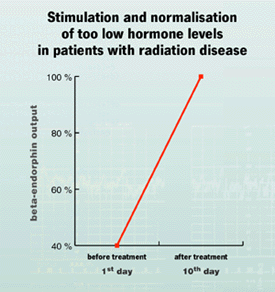The patients received complex medication and therapy: nootropes, vasodilatators, galvano therapy, adrenoblockers as well as a physiotherapy and for ten days they were treated with MRT-Music® each day for 30-40 minutes.
The hormone levels of beta-endorphin, ACTH and cortisol were measured before the MRT-Music® treatment and 30 minutes after the treatment.
Regarding ACTH and cortisol, no significant changes were registered. Not so with beta endorphin: with each MRT-Music® treatment the output of the hormone got stimulated.
After the 10th treatment the level had increased by 60% and reached its normal level.
If we compare these hormone investigations with those of mothers during parturition then it becomes obvious that Medical Resonance Therapy Music® generated a clear change in the opioid-activity in both investigation groups, but dependent on their initial level: was the initial level too low it increased the opioid-activity – was it too high, it reduced the opioid activity. This harmonizing, balancing effect of MRT-Music® on neuroendocrine regulation deserves utmost attention.
Investigators:
Dr. med. I. Stepanenko
Dr. med. D. Sutkovoy
Prof. Dr. med. A. Reznikov
